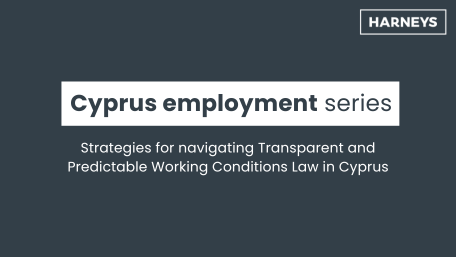Cyprus employment series: Strategies for navigating Transparent and Predictable Working Conditions Law in Cyprus

Despite the fact that the Law was preceded by similar legislation imposing a duty on employers to inform new employees of their employment particulars within a short timeframe following commencement of their employment and the new Law's clear intentions to ensure fair and transparent employment conditions in Cyprus, many employers in Cyprus still struggle to adequately reflect and implement its provisions, resulting in widespread non-compliance.
This view also appears to be shared by the Ministry of Labour and Social Insurance (MoL) which recently became more active in conducting random inspections at employers’ premises and worksites, in an attempt to pressure employers into compliance. Moreover, L.85(I)/2024 now introduces stricter enforcement mechanisms and penalties for non-compliance than initially existed under the Law.
From experience, common pitfalls include employers failing to provide written communication of material employment particulars to employees, such as adequate and precise job descriptions, clearly defined working hours, detailed breakdown of remuneration, specific employment duration (ie fixed term or indefinite), absence of a remote working policy (where one is required) and lack of comprehensive termination of employment procedures.
These shortcomings can lead to the rise of significant legal and operational risks faced by an employer. Moreover, employees may feel insecure in their rights and undervalued, resulting in decreased morale and productivity, which directly affects an employer’s profitability. Furthermore, non-compliance with the Law exposes employers to potential disputes, litigation, and penalties, ranging from fines to, in more serious cases, potential imprisonment, which could also result in serious reputational and financial damage.
Given the importance of this, the recent enactment of the amendment legislation adds an additional layer of pressure by penalising any employer who may decide to obstruct the MoL’s inspectors from carrying out their statutory duties and exercising their wide rights of inspection. This includes refusing to answer or providing false answers during investigations, failing to present required documents, or attempting to hinder any person from appearing before, or being examined by, an inspector. Offenders can face imprisonment for up to six months, a fine of up to €10,000, or both. Importantly, where an offence is committed by a legal entity, individuals holding positions of responsibility (such as directors or senior managers) may also be held personally accountable, unless they can prove that the offense occurred without their consent, involvement, or negligence.
Therefore, cooperation with the MoL’s inspectors and clear and thorough communication of employment particulars, in compliance with the Law’s provisions, following proper legal advice, are essential to fostering a stable, transparent, and compliant work environment and tempering, as much as possible, an employer’s legal and operational risks in this regard.
For more information on this subject, please reach out to the authors or your usual Harneys contact.


